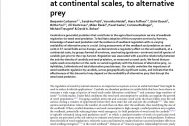Content
Carabids are generalist predators that contribute to the agricultural ecosystem service of seedbank regulation via weed seed predation. To facilitate adoption of this ecosystem services by farmers, knowledge of weed seed predation and the resilience of seedbank regulation with co-varying availability of alternative prey is crucial. Using assessments of the seedbank and predation on seed cards in 57 cereal fields across Europe, we demonstrate a regulatory effect on the soil seedbank, at a continental scale, by groups formed of omnivore, seed-eating (granivore + omnivore) and all species of carabids just prior to the crop-harvest. Regulation was associated with a positive relationship between the activity-density of carabids and seed predation, as measured on seed cards. We found that per capita seed consumption on the cards co-varied negatively with the biomass of alternative prey, i.e. Aphididae, Collembola and total alternative prey biomass. Our results underline the importance of weed seedbank regulation by carabids, across geographically significant scales, and indicate that the effectiveness of this biocontrol may depend on the availability of alternative prey that disrupt the weed seed predation.



